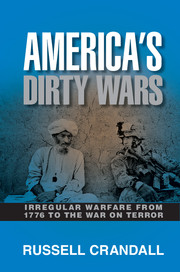Book contents
- Frontmatter
- Dedication
- Contents
- List of Figures
- Acknowledgments
- 1 Introduction
- 2 Irregular Warfare 101
- Part One The American Revolution to Chasing Sandino, 1776–1930s
- Part Two The Cold War, 1940s–1989
- Part Three Latin America and the Cold War, 1950s–1980s
- 20 From Guatemala, 1954, to Cuba and the Bayof Pigs, 1961
- 21 Guatemala, Post-1963
- 22 Cuba, Post-1963
- 23 Intermezzo
- 24 Carter, Reagan, and the Sandinista Revolution in Nicaragua, 1979–1990
- 25 El Salvador, 1979–1992
- Part Four Post–Cold War, 1990s–2000s
- Notes
- Bibliography
- Index
21 - Guatemala, Post-1963
Published online by Cambridge University Press: 05 July 2014
- Frontmatter
- Dedication
- Contents
- List of Figures
- Acknowledgments
- 1 Introduction
- 2 Irregular Warfare 101
- Part One The American Revolution to Chasing Sandino, 1776–1930s
- Part Two The Cold War, 1940s–1989
- Part Three Latin America and the Cold War, 1950s–1980s
- 20 From Guatemala, 1954, to Cuba and the Bayof Pigs, 1961
- 21 Guatemala, Post-1963
- 22 Cuba, Post-1963
- 23 Intermezzo
- 24 Carter, Reagan, and the Sandinista Revolution in Nicaragua, 1979–1990
- 25 El Salvador, 1979–1992
- Part Four Post–Cold War, 1990s–2000s
- Notes
- Bibliography
- Index
Summary
The duty of a revolutionary is to make revolution.
– Che Guevara, 1962There are some indications that Fidel Castro is planning to increase his support of the Guatemalan insurgency, perhaps to the point of dispatching a small force of guerrillas now undergoing training in Cuba.
– U.S. classified intelligence report, 1960sIf you [the Guatemalan people] are with us, we’ll feed you; if not, we’ll kill you.
– Guatemalan General Ríos MonttTo bring the story forward, six years after Operation PBSUCCESS, junior army officers in Guatemala attempted a coup against the ruling authoritarian regime headed by General José Miguel Ramón Ydígoras, who had taken power after Castillo Armas had been murdered. The year was 1960. Interestingly, the revolting officers were upset that the CIA was using Guatemala to train anti-Castro Cuban exiles. When the uprising foundered, a few of these officers retreated to the hills to organize a guerrilla insurgency, which they believed would be the surest avenue to radical social and economic change. Not surprisingly, they soon established contact with Havana. This incipient insurgent group became the Havana-backed MR-13 (Movimiento Revolucionario 13 de Noviembre), founded in 1960 with its base in the mountainous oriente (east) – in and around villages, such as Zacapa, whose names would become synonymous with the campaign of terror and atrocity that the country’s unfolding guerrilla conflict would produce. This group became the nexus of the insurgent forces that engaged in armed insurrection against the Guatemalan government for the next four decades. In addition to the MR-13 that soon integrated into the Guatemalan Labor Party (PGT), a motley alphabet soup of revolutionary acronyms such as Guerrilla Army of the Poor (EGP), the Revolutionary Organization of Armed People (ORPA), and the Rebel Armed Forces (FAR) comprised the total guerrilla force attempting to spark “another Cuba” in Guatemala. Over the next several decades, all sorts of communists, workers, activists, and other leftists joined these guerrilla bands.
- Type
- Chapter
- Information
- America's Dirty WarsIrregular Warfare from 1776 to the War on Terror, pp. 258 - 268Publisher: Cambridge University PressPrint publication year: 2014



